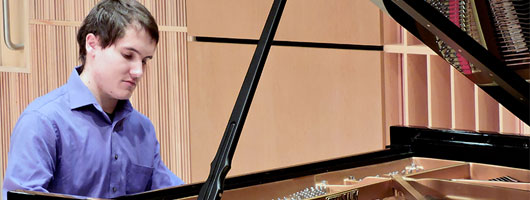 Pictured | Taylor Lyles | Music Education, Instrumental | La Porte, Indiana (hometown)
Pictured | Taylor Lyles | Music Education, Instrumental | La Porte, Indiana (hometown)Music Director, Michigan City High School
About the Bachelor of Music Education Instrumental Concentration
The Bachelor of Music Education (B.M.E.) is a professional undergraduate degree that offers rigorous music training, a solid foundation in general education, and meets the licensing requirements of the Indiana Department of Education.
Academic Advising
The Ernestine M. Raclin School of the Arts policy on advising requires that students meet with their academic advisors each semester prior to registration. Advising holds are placed on all Music students prior to advance registration and are released following advising appointments. Students with a declared major in Music are advised by Music faculty. Additionally, you may have a secondary adviser if you have also declared a minor, although a minor is not required for a degree in the Music Arts department. You can verify your assigned advisor in the student center in One.IU.
Degree Requirements (124 cr.)
Degree Map >>
Students receiving the Bachelor of Music Education Instrumental Concentration degree must complete 124 total credit hours including:
- IU South Bend Campuswide General Education Curriculum (39 cr.)
- Major Requirements (85 cr.)
- Education Requirement (21 cr.)
- Music Education Requirement (11 cr.)
- Technique (8 cr.)
- Music Requirements (45 cr.)
- Other Music Requirements (0 cr.)
- Additional Music Requirements (0 cr.)
- A minimum of 30 credit hours at the 300- or 400-level.
- Courses required for the major must be completed with a grade of C– or higher.
- A minimum CGPA of 2.0 is required.
- All Bachelor of Music Education students must successfully pass all sections of the Indiana Core Academic Skills Assessment (CASA) Basic Skills Exam (or demonstrate competence in basic reading, writing, and mathematics skills via Indiana Department of Education alternate assessments) prior to enrolling in EDUC-F 201 and EDUC-F 202.
- For more information on CASA exams, visit www.in.nesinc.com.
- Students must successfully pass all sections of the CASA Content Area Assessments prior to graduation.
- Instrumental concentration students who would also like to pursue the choral concentration must fulfill the choral concentration requirement and complete two semester of MUS-V 200 for 1 cr. each semester.
- An overall GPA of 2.75 and completion of the CASA Basic Skills Exam are required for admission into the Teacher Education Program and for student teaching. All courses with a grade of C- or lower must be retaken.
Major Requirements (85 cr.)
All courses are 3 credits, unless otherwise designated.
Education Requirements (21 cr.)
- EDUC-M 464 Methods of Teaching Reading
- EDUC-M 482 Student Teaching All Grades Music (12 cr.)
- EDUC-P 407 Psychological Measurement in the Schools
- EDUC-P 475 Adolescent Development and Classroom Management
Music Education Requirements (11 cr.)
Each of the following groupings are to be taken concurrently.
- MUS-M 216 Music Education Lab/Field Experience (0 cr.)
- MUS-M 236 Introduction to Music Education K-12 (2 cr.)
- MUS-M 317 Lab/Field Experience
VT: Music Education Lab/Field Experience (0 cr.) - MUS-M 337 Methods and Materials for Teaching Instrumental Music (2 cr.)
- MUS-M 318 Lab/Field Experience
VT: Music Education Lab/Field Experience (0 cr.) - MUS-M 338 Methods and Materials for Teaching Choral Music (2 cr.)
- MUS-M 319 Lab/Field Experience
VT: Music Education Lab/Field Experience (0 cr.) - MUS-M 339 General Music Methods K-8 (2 cr.)
- MUS-U 357 Music in Special Education
Technique (8 cr.)
- MUS-G 261 String Class Techniques 1 (1 cr.)
- MUS-G 281 Brass Instrument Techniques (1 cr.)
- MUS-G 337 Woodwind Techniques (1 cr.)
- MUS-G 338 Percussion Techniques (1 cr.)
- MUS-G 370 Techniques for Conducting (2 cr.)
- MUS-K 312 Arranging for Instrumental and Vocal Groups (2 cr.)
Music Requirements (45 cr.)
Core Musicianship (25 cr.)
- MUS-M 201 The Literature of Music 1
- MUS-M 202 The Literature of Music 2
- MUS-T 113 Music Theory I
- MUS-T 114 Music Theory II
- MUS-T 115 Sightsinging and Aural Perception I (1 cr.)
- MUS-T 116 Sightsinging and Aural Perception II (1 cr.)
- MUS-T 213 Music Theory III
- MUS-T 214 Music Theory IV
- MUS-T 215 Sightsinging and Aural Perception III (1 cr.)
- MUS-T 216 Sightsinging and Aural Perception IV (1 cr.)
- MUS-T 315 Analysis of Musical Form
Piano Proficiency (4 cr.)
Option 1
- MUS-P 101 Piano Class 1 (1 cr.)
- MUS-P 102 Piano Class 2 (1 cr.)
- MUS-P 103 Piano Class 3 (1 cr.)
- MUS-P 104 Piano Class 4 (1 cr.)
- MUS-P 105 Keyboard Proficiency (0 cr.)
Option 2 when piano is primary instrument
- MUS-P 105 Keyboard Proficiency (0 cr.)
- Secondary Instrument at 200 level (2 cr.) (two semesters)
Applied Music (7 cr.)
- MUS-_ 300 Principal Instrument (1 cr.) (every semester except when student teaching)
Ensemble (6 cr.)
Students pursuing the instrumental concentration may take one semester of ensemble for 0 credits.
For each semester of enrollment except when student teaching:
- MUS-X 040 University Instrumental Ensembles (1 cr.)
- MUS-X 070 University Choral Ensembles (1 cr.)
- MUS-X 350 Jazz Ensembles (1 cr.)
Instrumental Concentration (3 cr.)
- MUS-F 466 Techniques in Marching Bands (2 cr.)
- MUS-V 201 Voice Class (1 cr.)
Other Music Requirements (0 cr.)
- MUS-I 100 Cultural Events Attendance (0 cr.) (eight semesters)
- MUS-U 310 Performance Laboratory (0 cr.) (each semester prior to passing Upper-Divisional Examination)
- MUS-X 296 Applied Music Upper-Divisional Jury Examination (0 cr.)
Additional Music Requirements (0 cr.)
- MUS-I 311 B.S./B.M.E./B.M. Jazz Senior Recital (0 cr.)
- MUS-X 297 Music Education Upper-Divisional Skills Examination (0 cr.)
Photo credit | Teresa Sheppard